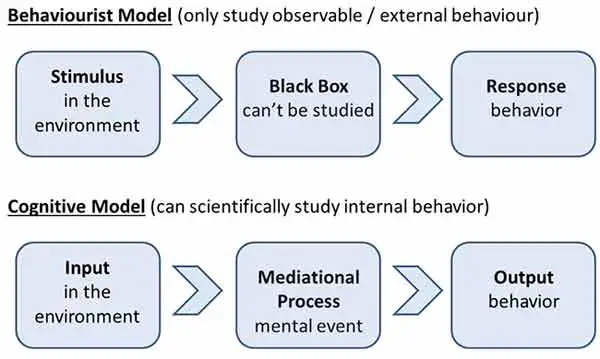Definition
Simply put, Social Learning Theory is a theory of learning and social behavior. But there’s more to learning.
Social Learning Theory discusses the cognitive process that takes place in a social context which occurs after an individual is exposed to information through observation or direct instruction.
Behavioral theories of learning suggest that behavior learning is solely driven by reinforcements. Bandura’s Social Learning Theory adds to the behavioral theories by placing emphasis on the important internal process that occurs in the individual’s brain.
The two important ideas he added to Social Learning Theory that was not explained in the Behaviorist theories were:
- Mediating processes occur between stimuli and responses.
- Observational learning is what causes the behavior to be learned from the environment.
Brief Idea about Observational Learning
The process of learning by watching others is called Observational learning. Observational learning is also referred to as vicarious reinforcement, modeling, and shaping.
Observational learning is classified as a form of social learning. But, Social Learning Theory talks about the importance of the cognitive process that occurs during observational learning.
(Read more about Observational Learning.)
However, since observational learning can be considered a fraction of Social Learning Theory, all examples of observational learning are also the examples of Social Learning Theory.
Read examples of Social Learning Theory.
Simply put, Bandura’s Social Learning Theory explains that people learn from one another via different methods such as imitation, modeling, and observation.
Social Learning Theory has also been referred as the bridge between behaviorist and cognitive learning theories due to Bandura’s explanation of various stages of social learning. (Detailed information on the stages of social learning can be found here.)
Bandura illustrated his theory about learning via observation and imitation through his famous Bobo Doll Experiment (Bandura, 1961).
Mediational Process
Unlike Skinner’s Behaviorist theories of learning where learning occurs due to stimulus-response, Bandura further elaborates the information process that occurs between stimulus and imitation of the behavior as a response.
Bandura believes human beings to be information processors. Simply put, Bandura believes that behavior learning could not occur if not for the cognitive processes.
Cognitive processes intervene the learning process which then goes on to determine whether or not a response is learned. Therefore, behaviors aren’t learned automatically simply because an individual is in the presence of a model.
The thought process that acts behind the scenes between the observation(stimulus) and actual learning(response) is defined as the meditational process.

Mediation Process
[source: simply psychology]
Key Concepts of Social Learning Theory
- Learning is not purely behavioral and wouldn’t be possible without the cognitive processes that occur in the social context.
- Learning occurs via observation and via observation of negative consequences of the behavior. This is referred to as vicarious reinforcement.
- There are three factors (in brief) that contribute to learning. 1. Observation. 2. Extraction of Information. 3. Decision making in regards to performing the behavior. This is called observational learning or modeling.
- While reinforcement is a factor contributing to learning, behavior learning is not solely governed by reinforcement/punishment.
- Individuals are not the passive recipient of information. In fact, human beings are information processors and factors like cognition; environment; and behavior; all mutually affect the process of learning. (Reciprocal determinism)
Bandura’s re-consideration of Social Learning Theory (SLT)
Bandura’s SLT takes into account the cognitive processes that come into play which decides whether or not any behavior is to be imitated. Due to this reason, SLT provides a more comprehensive explanation of human learning.
However, SLT still cannot explain how individuals learn or develop thoughts and feelings. For instance, just because an individual has been exposed to violent behavior doesn’t mean he/she might reproduce those violent tendencies.
Due to this reason, in 1986, Bandura renamed his SLT to Social Cognitive Theory (SCT). In Bandura’s words, it is a better explanation of how we, as human beings, learn from social experiences.
Critical Evaluation
Social Learning Theory is able to explain complex behavior, but its commitment to learning through either nature or nurture has exposed itself to some criticisms.
The major criticism is that SLT underestimates the complexity of human behavior and does not provide a full explanation for all behavior.
SLT is particularly applicable when there is no clear role model in play for an individual to learn behavior.
Recent discoveries in the field of neuroscience have provided some basis to support the theory of social learning. While the discovery of mirror neurons is in its infancy stage, it does provide a neurological basis to explain how human beings imitate behavior.
According to these recent discoveries, there are neurons which fire both when an individual observes actions from a model or performs the action itself.
A word from Psychestudy
While Social Learning Theory cannot explain all aspects of human behavior, SLT is one of the most plausible explanations of human learning. SLT can have both positive or negative impact on an individual.
Understanding of the SLT alone can lead this world to be a better place, in theory at least. For instance, parents who have properly understood Social Learning Theory can act accordingly in front of their children to contribute positive behavioral learning.

